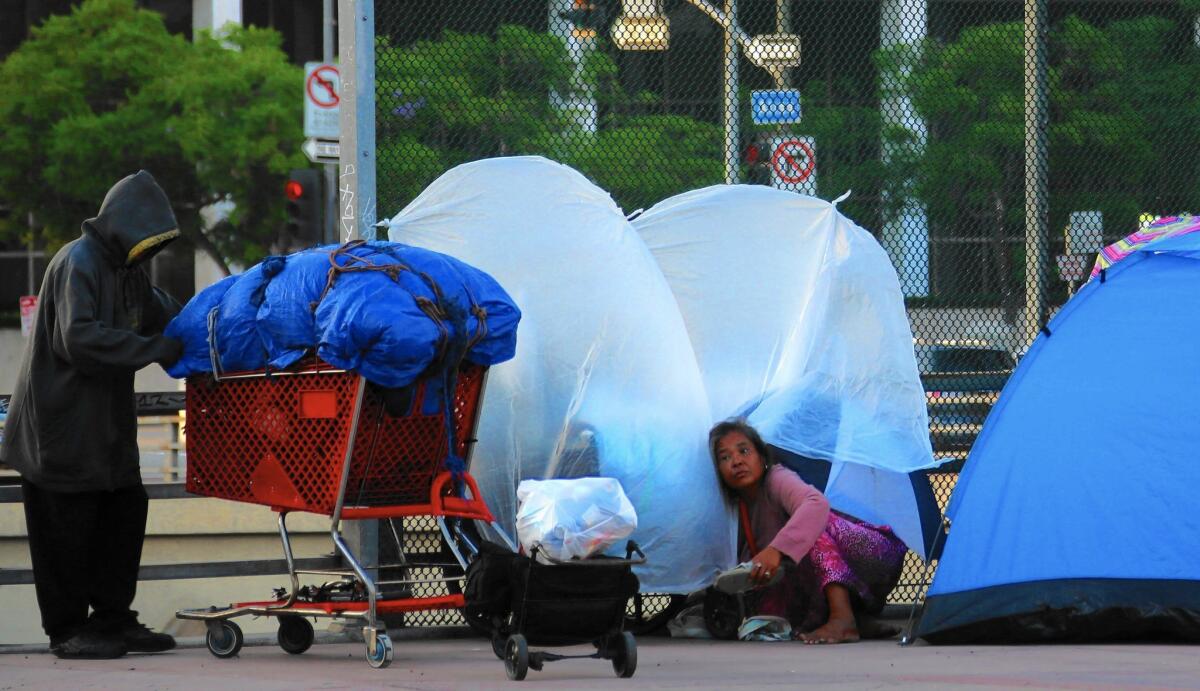L.A. council again set to take up homeless emergency declaration with potentially sweeping scope

- Share via
The Los Angeles City Council on Tuesday is slated to take up an emergency declaration to attack the city’s homelessness crisis with initiatives that could include opening shelters on public and private land, authorizing parking lots where homeless people can sleep in cars and vans, and developing storage facilities for homeless people’s belongings.
The council will also consider seeking state and federal aid for the homeless, including emergency funding usually restricted to natural disasters such as California wildfires or Hurricane Katrina. Also on the agenda is a proposal to roll back an enforcement measure targeting homeless people that was widely denounced as criminalizing homelessness and which had put as much as $28 million in federal homeless aid to the city at risk.
The council agenda does not call for identifying sites for the potentially controversial proposed projects or allocating money. But if enacted and funded, the measures would constitute the most sweeping city response to homelessness in decades and a departure from recent policies, which leaned heavily on cleanups and police enforcement.
The homeless population became a potent political issue this year, as street encampments spread far beyond their traditional confines in downtown Los Angeles. Since Mayor Eric Garcetti’s election in 2013, the city’s homeless population grew 12%, to 26,000, and more than 70% of the destitute people sleep in the streets.
The city and county are developing a comprehensive plan, to be released early next year, to combat homelessness, but advocates had been pushing for immediate action, particularly in the face of the predicted El Niño weather phenomenon that is expected to bring an unusually wet winter.
Garcetti and seven council members first announced they were seeking an emergency declaration on Sept. 22, but the proposal has been bottled up by legal questions. In a report released Friday, City Atty. Mike Feuer said the council could declare a shelter crisis, which would suspend state and local housing standards and health and safety provisions so homeless people could occupy public facilities. The council also can expand its current winter shelter program to allow shelters on sites owned or leased by nonprofit charitable organizations, the report said.
Subject to council approval, the mayor could declare a local emergency, the report said, that could trigger the state, and ultimately, the president to declare an emergency, presumably triggering new resources and funding.
Feuer pointed out there has never been a presidential declaration of emergency in response to a “chronic ongoing situation” such as the homeless crisis. But he said invoking the threat from El Niño and the particular risk for the homeless population “would provide a stronger basis for a presidential declaration of emergency” and could possibly trigger emergency assistance funds from the Federal Emergency Management Agency.
The report also noted that the San Diego City Council had adopted a local affordable housing emergency declaration and then renewed it every two weeks since 2002, but “it is unclear what benefits, if any, San Diego received.”
Gary Blasi, a retired law professor and homelessness expert and now special counsel to Public Counsel’s Opportunity Under Law program, said the proposed actions could “become something” but noted that they provide no immediate relief.
“The council needs to act immediately to help homeless people weather the storms that are coming and help meet their immediate needs as human beings, while it deliberates on real, long-term solutions to ending the shame of mass homelessness in this city,” Blasi said.
The city adopted an ordinance in July to make it easier to break up homeless people’s camps and seize and store or destroy their belongings. Federal officials this year began imposing financial penalties on jurisdictions that criminalize homelessness and fail to reduce their homeless populations.
The modifications under consideration Tuesday would drop criminal penalties and fines against homeless people for storing possessions on city streets, and homeless belongings could only be impounded if the city provides voluntary storage facilities.
Blasi and members of Los Angeles Community Action Network, a skid row advocacy group, on Thursday called for repealing the measure and other ordinances police use to clear the sidewalks.
At the news conference, LA CAN member Sean Gregory said he spent three days in jail for dallying when police cleared skid row sidewalks one morning.
“I stopped to tie my shoelaces,” Gregory said.
Also Thursday, the council’s homelessness and poverty committee approved in concept appointing a homelessness coordinator or “czar” to oversee the city’s initiatives.
ALSO
Democratic debate offers proving ground for Bernie Sanders as Clinton pulls away
A frenzied start for state’s traffic ticket amnesty program
Tour bus crash in San Francisco’s Union Square injures at least 19, five critically
More to Read
Sign up for Essential California
The most important California stories and recommendations in your inbox every morning.
You may occasionally receive promotional content from the Los Angeles Times.











